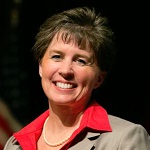 Alison McCaffree, Washington Nonprofits
Alison McCaffree, Washington Nonprofits
On the job since: 2011
Organization formed in: 2009
Geographic scope: Washington
2015 budget: $1.1 million
Staffing: 7 FTE
What are the most important issues facing the nonprofit sector in your state?
- Dilution of Nonprofit Value. With the increased in corporate social responsibility, social entrepreneurism and various hybrid business models combined with for-profit business finding ways to make money on what was traditional nonprofit services, it's becoming harder for the general public to understand our value. In addition, the public and government officials do not understand the economic impact of the nonprofit sector.
- Equity. Nonprofits cannot accomplish their mission without addressing issues on inequity and systematic oppression no matter what you field of service. Our world is interconnected and the diversity of our communities is increasing. You will not succeed unless you figure out how to authentically get the most out of and for everyone you touch.
- Changing Funding Sources. Nonprofits need to find creative ways of diversifying their funding. Many have taken up earned revenue strategies to compensate for decreased government funding. We will need to figure out how to leverage debt more and advocate for more government involvment in things such as Pay for Success financing models.
What are your core strategies for addressing these issues?
Washington Nonprofits is increasing the strength of organizations by engaging individuals in both learning networks and impact networks. The more people are involved in solving the complex problems, the more they will understand the role of advocacy and engage in public policy. WN Learning ensures that nonprofit staff and volunteers, including board members, can better achieve their mission because they can learn what they need to know and gain access to tools and experts. We connect nonprofits together so that they can strengthen their capacities and build connections that solve their communities’ most critical issues. WN Public Policy and Advocacy provides leadership in policy issues that broadly affect nonprofits, finds ways to increase nonprofit capacity to effectively advocate; and builds and expand community-based networks to demonstrate and communicate impact. We act as a container: convening, nurturing, connecting and strengthening local networks while allow the people in the network to define their own needs and goals.
How can philanthropy best support capacity building for the nonprofit sector in your state? What sorts of investments are most needed?
- Leadership Development. The world of leadership development in changing and expending and the need for the nonprofit sector to develop the next generation of leaders is critical. Funders should look more to advancing all kinds of opportunities for leaders to engage in a variety of training, coaching, peer interaction. And in addition, they should give funds to organizations so that there services can be sustained while the chief fund raisers are spending time investing in themselves and ultimately the organizations long term health. Not to mention the sector's health.
- General Operating Support. Create high trust with organization and let them decide where best to use the money. If a funder believes in the mission and trust the leadership, then give general operating support. Put as few strings attached to this support and be a partner to the organization to help them meet their goals.
- Multi-Year Grants. No transformation change happens in a year. If we are truly gong to support organizations, then we should do it for the long run. Funders should say, "We want to support you until we (together) have achieved the goal." Define the goal and then stick with the organization until it is achieved.
What’s been a recent big success for your organization and what excites you about it?
In January 2016, we launched The Washington Nonprofit Institute through a partnership with the Office of the Secretary of State, 501 Commons, Wayfind and many regional partners. Our goal is to significantly expand board training accessible to nonprofits in every community in Washington State. We are doing this through a three-pronged learning approach:
- Online: anytime-anywhere learning, information and referral.
- Distance learning through regular free webinars.
- In-person trainings and conferences with an expanded network of trainers in six regions.
This success came after a decade of advocacy (getting a bill passed that made a nonprofit education fund), partnering (working with the Office of the Secretary of State), and implementation (building a learning program big enough to serve the entire state).
What are the most important public policy issues for you this year, and what are you doing about them?
Washington Nonprofits want to support all nonprofits who are working on specific advocacy goals. We estimate there will be about 300 bills introduced in the state legislature this year that pertain to nonprofits and their mission. We are categorizing them and coding them to six overarching goals. We will be able to access the sectors capacity to effect change at the state legislature and work toward aligning policy goals from different fields of service.
Coming up: The Washington Bar Association's nonprofit committee has completed a redrafting of the Nonprofit Corporations Act, which will help us comply with the rules around being a nonprofit. It will be introduced in the 2017 session.
What are the one or two best opportunities you see for nonprofits and philanthropy to “go beyond the grant” to work together to create sustainable change in communities?
- Impact Communities. We need more funders to get involved in the conversations that make meaning out community data, as we convene communities to understand complex issues.
- Attend Conferences and Networking Events. We have to build relationship between service organizations and philanthropy — who are, by the way, both nonprofits. One of the best ways to do that is to attend networking opportunities. Washington Nonprofits now hosts three conferences that together bring in more than 1,200 people. There are also many more local and regional events. Philanthropy should not be afraid of the 'ask' and should engage and learn with nonprofit service organizations. Nonprofits should understand the venue and treat funders as people, too — not just avenues for money.
Alison McCaffree is executive director of Washington Nonprofits, joining us this month for our virtual roundtable with state nonprofit association leaders.